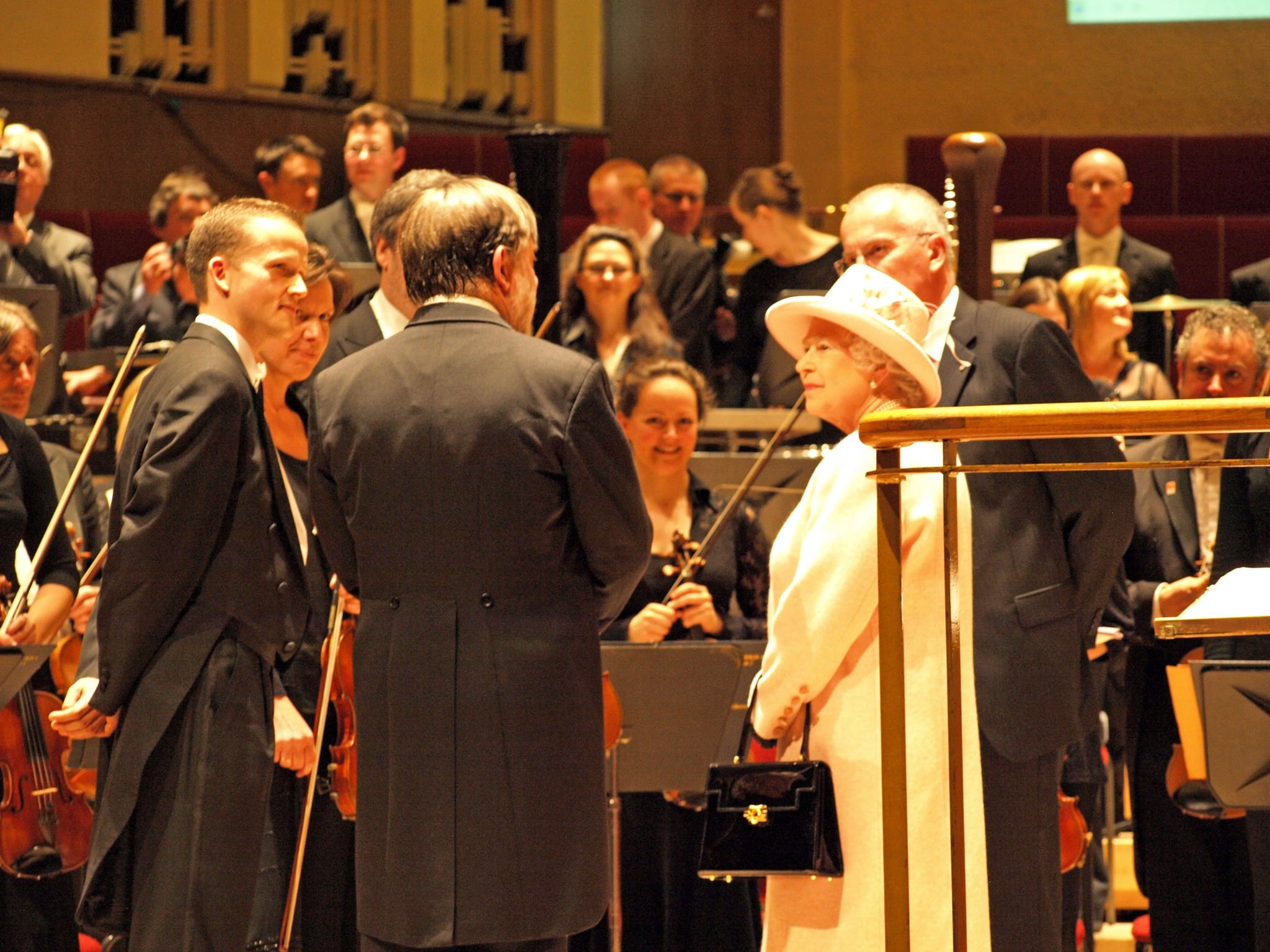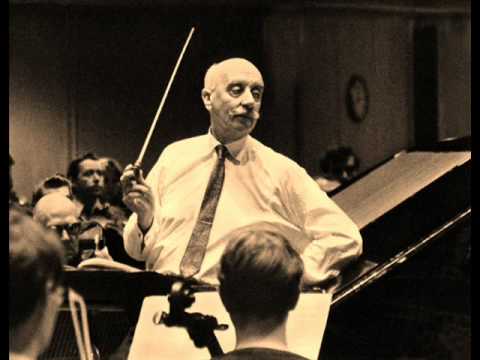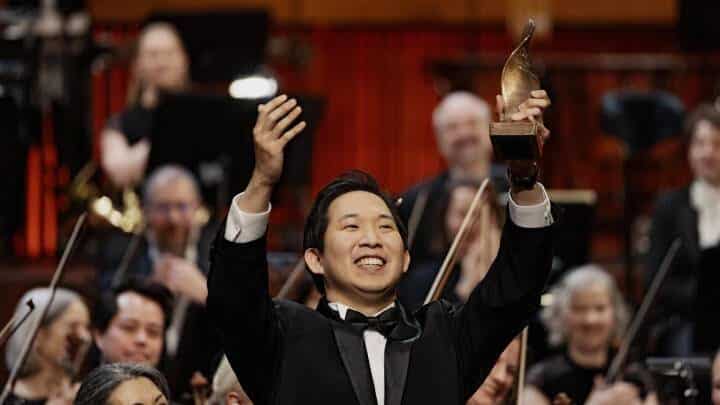Fabio Luisi: Orchestras need older musicians
mainThe outgoing principal conductor of the Metropolitan Opera has bucked the current trend of replacing older orchestral musicians with inexpensive young ones.
Here are his contributions to a running Slipped Disc debate:
Orchestras NEED older musicians, they bring experience, wisdom, knowledge and – yes! – they can also help young music directors to find their real way if they (the music directors) trust them (the older musicians) and learn from their experience. Of course, they know so much, they have played such a huge repertoire with a lot of different conductors – many among them were excellent conductors. Young conductors fear this kind of experience, because it forces them to compare themselves with important musicians – conductors – of the past. Older musicians carry this tradition and they are able to tell if the young conductor has valuable ideas or …. he is just musically arrogant.
*
I can understand that at times there (are) musicians in orchestras who are beyond their zenith. In that case, it has always been important to me to protect them, e.g. convincing them to switch to a less exposed position, if possible. Firing them has never been an option for me. In any case I just wanted to make a statement about something which seems to me to becoming usual for new appointed music directors, especially if young or afraid of experienced musicians (who could be seen as a threat to them, because of their knowledge and experience). I always tried to learn from my musicians, especially the older ones, in every orchestra I was so fortunate to be music director.






Hear Hear. What Mo. Luisi describes is another crucial factor contributing to the homogenization of sound and style and blandness infecting orchestras the world over. The pandemic is particularly notorious with the fabled Berlin and Vienna Philharmonics, neither of which have sounded fabled or distinctive for a good number of years.
Even though the jet has made much homogenization in worldwide orchestra sounds partially because of jet-setting conductors, I still find the Philadelphia Orchestra, Vienna and Berlin Philharmonics, and Amsterdam Concertgebouw distinctly different from each other as heard in the same season in NY.
It might be argued, that a sound of an orchestra is not only based on a certain tradition – as fuzzy as that term often is to even the orchestra members themselves – but probably a large role, if not the largest, also play the on-stage acoustics of a venue an orchestra usually rehearses and performs in. Orchestras adapt to that. Orchestras that play in halls that do not transmit strength well, like vineyard/arena halls like Berlin Philharmonie, will play louder and more aggressive. Orchestras that perform regularly in shoeboxes – which transmit more strength of sound to the majority of the listeners – like Vienna Phil or Concertgebouw, will play softer and warmer.
While I can agree with your basic principle, Berlin doesn’t really fit in as you portray them, at least on tour. I have heard about 30 concerts that they played at Carnegie Hall over the years, and they have the greatest range of soft dynamics of any orchestra that I have heard, certainly with more subtlety than Vienna or the Concertgebouw (both of which have plenty of other positive attributes).
Both the basic principle and the concrete examples here are essentially wrong. “Shoebox” halls do not generally “transmit” the sound better, nor can the musicians hear themselves generally better on stage in them, there are some that have very good acoustics and some which are fairly dead. Not do “vineyard/arena” halls not generally transmit the sound better – the Philharmonie in Berlin for instance has crystal clear acoustics and the sound, including very soft sounds, carry very well throughout most of the hall.
Nor can it be said that the Berliner Philharmoniker generally play with more nuance and subtlety than the Wiener or the Concertgebowourkest, all of these and many other good orchestras command a very wide dynamic range and are capable of expressing all the nuances and subtleties any interpretation demands, if called upon.
Berlin plays loud. Of course they can also play a delicate pianissimo, but it needs a lot of enforcement by the conductor. Vienna much less so. There was a reason why Celibidache called them the “mezzoforte orchestra”. Because they are more subtle.
As far as shoebox vs arenas goes, you might want to check for instance this.
https://www.sciencedaily.com/releases/2014/03/140303143407.htm
Shoeboxes (Vienna, Concertgebouw, Boston, …) are louder, have more strength over the whole spectrum. Berlin Philharmonie is weak, particularly in the bass registers. All of that is known int he acoustical world.
Except that in my long and varied experience as a listener, Berliner Philharmonikers those superb qualities of making music at least a little bit better and with slightly more consistency than anyone else. In addition to technical accuracy and virtuosity, their unanimity of tonal expression and flexibility of phrasing remain unmatched. As for the halls, it is certainly true that there are good and bad ones in many shapes and sizes, but it is also true that home acoustics do influence the way orchestras play and balance their sonorities.
In my first sentence above here, feel free to insert REACH or ACHIEVE between two words of your choice.
Except what Luisi is talking about isn’t happening in those orchestras, many of their musicians stay until retirement age so there is always a good balance between the “old” and the “young”, and of course they both still sound fabulous and the WPh in particular sounds as distinctive as ever. So that’s just empty babbling there.
+1 !
I don’t know which orchestras you are referring to, but in the well known case of the Indianapolis Symphony, it is happening right now and even with the supposed protection of the AFM. Bravo to the wonderful Maestro Luisi.
In this comment, MS was responding to the one at the very top of this thread and therefore was referring to Berliners and Wieners.
A very thoughtful comment from a wonderful musician. When conductors show appreciation for the talents, knowledge and wisdom of the musicians they lead (serve) a lot of good things happen.
Thank you for the wonderful commentaries!
It’s interesting to me to realize that many agree with the fact that experienced musicians in an orchestra are valuable assets and should not be viewed as a financial burden or threat to the younger music directors.
Mr. Luisi’s comments go much to his credit and speak volumes not only about his humanity, but also about the level of his artistry. Ours is a time obsessed with image and appearance, and the conductor industry plays right into this reality which has to do much with marketability often at the expense of everything else, and being old(er) does not bode very well according to such a superficial mindset. Very, very few of today’s conductors have something truly special to say, and a very large majority of them already benefits from the knowledge and experience of an orchestra before them which frankly, in a vast majority of cases, simply does not need them. Once in a great while, we see someone who is a true artist, someone who has something special to say, but in most cases what we see are nice faces with a correct technique — not to mention the already known caveats of narcissism and, in some cases, psychopathy. Call me old-fashioned, but I remain somewhat skeptical when the industry tries to sell us the idea of a 30 or 35 year old conductor having anything special to say in Mahler or Bruckner. But today’s audiences no longer have ears — everything has become visual and supposedly “exciting”, and it’s true that in that department most contemporary conductors are perfectly suited to the task.
Again, Hear Hear.
“I remain somewhat skeptical when the industry tries to sell us the idea of a 30 or 35 year old conductor having anything special to say in Mahler or Bruckner.”
Gustavo Dudamel all but in name.
Most of them don’t have much in the way of technique, unless flailing and grunting and dancing is part of modern conducting technique. Show us the damn music with your technique (and I don’t mean just beat patterns).
Thank you, Maestro Luisi! Lots of grey heads in orchestras around the world being held much higher today, proud in the knowledge that this great conductor has declared us valued and important.
I couldn’t agree more, it’s wonderful to play with experienced musicians, with those who actually know what Bernstein or Karajan wanted in a piece and why. These musicians have wonderful memories and experiences that enrich the whole orchestra, I find them inspiring and inspiration leads to great music-making.
He’s not only an excellent conductor, but obviously a gentleman who is full of wisdom, compassion and without a trace of arrogance. The world needs more conductors like him!! I have always enjoyed working with him.
With all due respect to Yannick Nezet-Seguin being selected as the incoming Music Director (which is a fine choice), I would have preferred if the Met installed Fabio Luisi instead. Here is some discussion on what was considered a possibility:
http://www.nytimes.com/2011/04/24/arts/music/fabio-luisi-james-levines-heir-apparent-at-the-met-opera.html?action=click&contentCollection=Music&module=RelatedCoverage®ion=Marginalia&pgtype=article
http://www.nytimes.com/2011/09/18/arts/music/fabio-luisi-steps-in-for-levine-at-met-opera.html
And did you know Fabio Luisi has a side job?
https://www.nytimes.com/2014/03/06/fashion/the-met-conductor-fabio-luisi-seduced-by-creating-his-own-perfumes.html?_r=0
Thank you Maestro. Maybe the British orchestras could take heed of his comments. Not only do the older experienced and more often than not still extremely fine musicians bring a whole different sound and musical “level” to an orchestra it seems that so often “they that make the decisions” about hiring younger players in preference to older players seem to forget that older players still have mortgages to pay, bills to pay and need to eat. It’s shocking the way so many are thrown onto the scrap heap to make room for “younger players coming up”. These decisions are usually made by those fortunate to be in permanent orchestral jobs and therefore have regular employment. They don’t find themselves literally cleaning toilets when times get hard and work is slow, as I have been shocked recently to hear one very fine and very experienced older colleague of mine has been doing. We should look after all of our fine musicians.
I agree wholeheartedly, a mix is needed, but disapprove of his “never” firing a skill-declining musician — such a talent may be a boon to a more provincial orchestra, but for top tier places (like the met) they have to be pruned to keep up standards — that is crucial (they can step/segue into teaching or playing in a lesser orchestra
Bear in mind that Levine brought the Met from a pretty-good orchestra to the world-class one it is now, without firing a single player. (Don’t know whether he “gently encouraged” a few retirements though)
This is a very common statement, that Jimmy brought the Met orchestra from decent to world class. First of all, recordings of the Met from the 1960s and earlier are quite good, and some from the 1970s and 80s I’ve heard aren’t hugely different. In addition, the Met went through a period of growth in the 1970s, as well as a change in work rules and scheduling (also expedited by a few work stoppages), both of which allowed the players to earn more, a lot more and work significantly less (compared to the insane schedule of no days off, no sick leave etc). Who is to say that this didn’t attract better players into the orchestra, just as commercial work in New York started to decline, and ultimately did? In other words, the arrival of Levine and the improvement in the quality of the Met Orchestra might be less related than is frequently claimed. But heck, that would mean ruining a good (and excellent for PR) story.
What PR agency paid you. Unnecessary and unproven statement
It reads to me more like that you are working for one? The statement you attack ad hominem (telling) sounds very reasonable to me.
Jackie is right, Helen Wynn, sorry! It is you who have no knowledge.
Yes, recordings of the Met from the 1950s and 60s are quite good. I still hear a difference; it reminds me of the difference between, say, the Vienna Symphony and the Vienna Philharmonic.
“Who is to say that this didn’t attract better players into the orchestra…”
Well, to get “better” players into the orchestra in enough numbers to make a difference, many of the “worse” ones would have to leave; and why would they leave if they were gaining better working conditions and significantly higher pay? I don’t have proof, I just have a memory of an interview where he (Levine) said he had accomplished this change without firing anyone.
Many of us are familiar with the experience of a conductor who pulls from you better playing than you thought you were able to produce. Each time you play well, it can build your confidence to play well the next time; over time, with enough water & sunlight, you can actually become a better player, as opposed to an OK player who plays really well now & then. —If you have a conductor who thinks it’s worth the time & trouble. Mr. Luisi sounds like he might be one of these conductors. (The same process can also be applied to an “old dog” learning the new trick of playing 2nd, or a 2nd player learning to play principal)
Levine demoted a principal second or associate principal second violinist, not sure which, to the back of the section, and tried to but didn’t succeed in demoting a principal flutist to the second chair, both happened in the late 70s/early 80s. Just for the record. That’s the demotion I know of. Don’t believe there were firings, but he apparently did do cleanup.
Levine DID make a major difference, but you are right that working conditions improved dramatically. Anyone interested in this would do well to find a book called “Behind the Gold Curtain: 50 years in the Metropolitan Opera Orchestra” by David Berkowitz and Dolores Soyer. Berkowitz, a violist in the orchestra was also the union rep for many years. He talks about the conditions that the musicians had to work under in the old days and the toll it took on them. Negotiations led to better working conditions over the years, and from Levine’s time onward, things were much better. I don’t have the book in front of me right now, but I think Berkowitz felt as you did about Levine, but I’ve known enough people from later generations — in the pit and onstage — who worked with him who knew him to be both a singer’s conductor and an orchestra builder.
Try to find that book, though. It’s pretty hard to lay hands on. I treasure my copy. Berkowitz was a great teller of stories and he had a very long memory going back to Bodanzky, Panizza, Walter and many conductors from the thirties and before. (He came there in the thirties, but as a young man, many of these conductors pre-dated him.)
Finally – a voice of reason! Thank you Maestro. Unfortunately, we live in an era where many auditions are held behind a screen – the result being that professional orchestras are being inundated with 21-year-olds who play exceedingly accurate auditions but know essentially nothing about anything else. Little experience, little idea about blending, little musical knowledge. Do we want orchestras made up of these talented but far-from-ready kids?? I say a most emphatic “NO!”
Holding auditions behind the screen is the best feature of this imperfect way of hiring people. Good audition panels know that accuracy is only one ingredient that is necessary for a fine orchestral player. Therefore we pay very close attention to the musicianship, intelligence and stylistic maturity of every candidate. When a young person is talented and accomplished in all these ways, experience comes quickly.
Thank you, Maestro Luisi!
My gravest concern is that the reason many orchestras are forcing retirement and looking for “younger, fresher talent” is to save money.
You cannot serve both Art and Money.
I was so impressed with Maestro Luisi’s wise and thoughtful comments that I wanted to learn more about him. So many conductors lack the humanitarianism, the consideration for their players which he has expressed.
I found this excellent NYTimes article which reveals a bit more about Maestro. A great musician with a successful career who has remained kind and who values his players.
How fortunate for any orchestra to be able to work with him!
https://www.nytimes.com/2016/02/07/arts/music/fabio-luisis-future-looks-bright-wherever-it-is.html?_r=0
In my forty years as a professional trumpeter, thirty-one of those spent as Principal Trumpet of l’Orchestre de la Suisse Romande, I can say unequivocally that Maestro Luisi is, was, and always will be my number favorite conductor/musician of all time. And that was BEFORE I read his comments on experienced musicians. He was always incredibly well-prepared and polite. He also had a very clear and expressive conducting style and was very musical in his interpretations whether it was Beethoven, Mahler, or Stravinsky.
I am glad to see this recognition of the contribution of older musicians. While it is true that there is some physical decline of musicians, this is often offset by wealth of experience and musicality. An orchestra is a living organism, fluctuating in personnel, but hopefully retaining an identity which is passed down from generation to generation. This legacy of experience can only be transmitted by senior musicians.